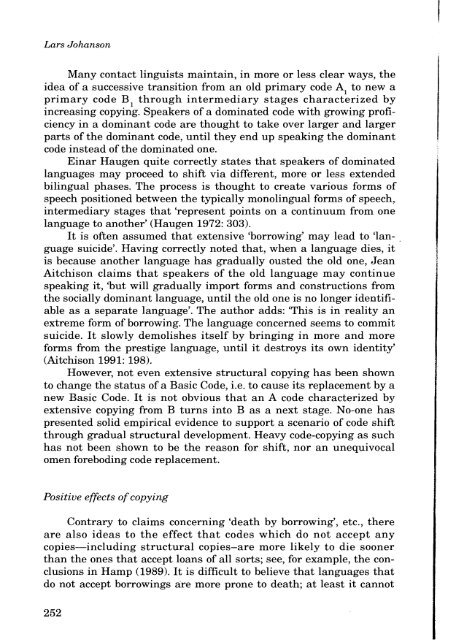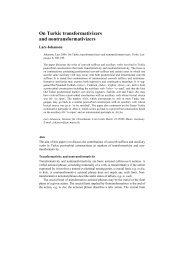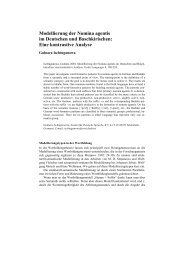Code-Copying - Turkic Languages
Code-Copying - Turkic Languages
Code-Copying - Turkic Languages
- No tags were found...
Create successful ePaper yourself
Turn your PDF publications into a flip-book with our unique Google optimized e-Paper software.
Many contact linguists maintain, in more or less clear ways, the<br />
idea of a successive transition from an old primary code Al to new a<br />
primary code B through intermediary stages characterized by<br />
increasing copying. Speakers of a dominated code with growing proficiency<br />
in a dominant code are thought to take over larger and larger<br />
parts of the dominant code, until they end up speaking the dominant<br />
code instead of the dominated one.<br />
Einar Haugen quite correctly states that speakers of dominated<br />
languages may proceed to shift via different, more or less extended<br />
bilingual phases. The process is thought to create various forms of<br />
speech positioned between the typically monolingual forms of speech,<br />
intermediary stages that 'represent points on a continuum from one<br />
language to another' (Haugen 1972: 303).<br />
It is often assumed that extensive 'borrowing' may lead to 'lan- .<br />
guage suicide'. Having correctly noted that, when a language dies, it<br />
is because another language has gradually ousted the old one, Jean<br />
Aitchison claims that speakers of the old language may continue<br />
speaking it, 'but will gradually import forms and constructions from<br />
the socially dominant language, until the old one is no longer identifiable<br />
as a separate language'. The author adds: 'This is in reality an<br />
extreme form of borrowing. The language concerned seems to commit<br />
suicide. It slowly demolishes itself by bringing in more and more<br />
forms from the prestige language, until it destroys its own identity'<br />
(Aitchison 199 1: 198).<br />
However, not even extensive structural copying has been shown<br />
to change the status ofa Basic <strong>Code</strong>, i.e. to cause its replacement by a<br />
new Basic <strong>Code</strong>. It is not obvious that an A code characterized by<br />
extensive copying from B turns into B as a next stage. No-one has<br />
presented solid empirical evidence to support a scenario of code shift<br />
through gradual structural development. Heavy code-copying as such<br />
has not been shown to be the reason for shift, nor an unequivocal<br />
Omen foreboding code replacement.<br />
Positive effects of copying<br />
Contrary to claims concerning 'death by borrowing', etc., there<br />
are also ideas to the effect that codes which do not accept any<br />
copies-including structural copies-are more likely to die sooner<br />
than the ones that accept loans of all sorts; See, for example, the conclusions<br />
in Hamp (1989). It is difficult to believe that languages that<br />
do not accept borrowings are more prone to death; at least it cannot




